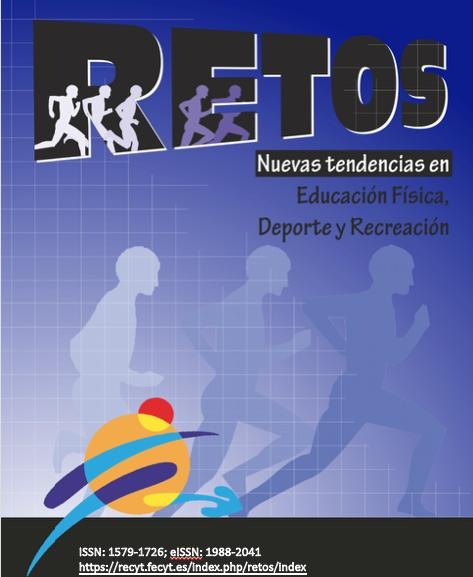Pedagogical innovation in Physical Education through digital storytelling: an experience in Ecuadorian classrooms
DOI:
https://doi.org/10.47197/retos.v71.115126Keywords:
Digital learning, digital storytelling, pedagogical innovation, Physical Education, technological resourcesAbstract
Introduction: Digital storytelling is emerging as an innovative pedagogical tool with potential to enrich teaching and learning processes. In Physical Education, it supports the integration of communicative, technological, and creative skills.
Objective: To analyze the perceived impact of digital storytelling on learning in Physical Education in schools in the province of Guayas, Ecuador.
Methodology: A quantitative, non-experimental, and descriptive design was used. A validated questionnaire was applied to a final sample of 30 teachers and 150 secondary-level students. The instrument addressed the following dimensions: perception of digital storytelling, motivation and participation in classes, and perceived learning outcomes.
Results: Findings indicated that 87% of students and 73% of teachers reported a favorable perception of digital storytelling. Motivation and participation showed high levels of agreement, and perceived improvements in understanding content were also noted. The technological perception dimension obtained the highest mean among students.
Discussion: These findings align with previous research that supports the pedagogical value of active methodologies based on digital resources, particularly in the field of Physical Education.
Conclusions: Based on the results of this sample, digital storytelling appears to be a promising strategy to energize Physical Education teaching, fostering more inclusive and participatory environments.
References
Alulima, L., Cueva, H., Chiluisa, M., y Cherres, H. (2024). Integrating Digital Narrative in Social Studies Teaching: Impact on Learning and Skills Development. En Á. Rocha, C. Ferrás, J. Hochstetter Diez, & M. Diéguez Rebolledo (Eds.), Information Technology and Systems. ICITS 2024 (pp. 420–429). Springer. https://doi.org/10.1007/978-3-031-54256-5_40
Amo, J., y Núñez, P. (2020). Lectura y educación literaria. Nuevos modos de leer en la era digital. Edu-catio Siglo XXI, 38(1), pp. 263-268.
Arias, O., y Del Campo, G. (2024). Narrativas transmedia como herramienta innovadora para el apren-dizaje interactivo en entornos educativos digitales. REDILAT, 5(6). DOI: https://doi.org/10.56712/latam.v5i6.3177
Bergman, A., Brun, D., & Nunez, L. (2020). Digital storytelling in education: A pedagogical perspective. Education and Information Technologies, 25(4), 301-315. https://doi.org/10.1007/s10639-019-10399-4
Creswell, J. W. (2014). Research design: Qualitative, quantitative, and mixed methods approaches (4th ed.). Sage Publications.
Galarza, A., Valencia, J., Tanguila, M., y Zambrano, A. (2024). Narrativas digitales: una experiencia con estudiantes de Educación General Básica. Mamakuna, (24), 36–47. https://doi.org/10.70141/mamakuna.23.1042
Grey, G., Soler, R., y Robinson, J. (2024). Estrategia didáctica para el uso de la narrativa digital en la educación básica superior. CIENCIAMATRIA, 10(2), 596-612. https://doi.org/10.35381/cm.v10i2.1392
Lambert, J. (2013). Digital storytelling: Capturing lives, creating community (4th ed.). Routledge.
LOEI. (2015). Ley Orgánica de Educación Intercultural. Recuperado de https://www.evaluacion.gob.ec/wp-content/uploads/downloads/2015/06/LOEI1.pdf
Neira, M. (2023). Ficciones digitales para la educación literaria: un análisis de aplicaciones para pre-lectores. Revistas UVigo, 21. https://doi.org/10.35869/ailij.v0i21.4567
Ohler, J. (2013). Digital storytelling in the classroom: New media pathways to literacy, learning, and creativity. Corwin Press.
Pegalajar, M., y Rodríguez, Á. (2023). Digital literacy in university students of education degrees in Ecuador. Frontiers in Education, 8. https://doi.org/10.3389/feduc.2023.1299059
Pickeral, J. (2021). A Digital Storytelling Intervention: How Narrative Can Motivate Physical Activity in University Students. Journal of Health Education Research & Development, 9(1), 1–7. https://doi.org/10.35248/2380-5439.21.9.632
Quintero González, L. E., Jiménez Jiménez, F., & Area Moreira, M. (2018). Más allá del libro de texto. La gamificación mediada con TIC como alternativa de innovación en Educación Física (Beyond the textbook. Gamification through ITC as an innovative alternative in Physical Educa-tion). Retos, 34, 343–348. https://doi.org/10.47197/retos.v0i34.65514
Robin, B. R. (2016). The power of digital storytelling to support teaching and learning. Digital Educa-tion Review, 30, 17–29.
Robin, B. R., & McNeil, S. (2019). What educators should know about teaching digital storytelling. Te-chTrends, 63(5), 505–509. https://doi.org/10.1007/s11528-019-00396-z
Ruiz, C., Gómez, Y., Vidal, N., y Usta, W. (2022). Digital Storytelling: La narrativa digital en la práctica docente. CIENCIAMATRIA, 8(2), pp. 837-852. DOI: https://doi.org/10.35381/cm.v8i2.992.c
Ruiz, M., Ballester, I., y Martínez, F. (2024). Educación literaria, herramientas digitales y ODS: Análisis de percepciones entre el alumnado universitario en formación. Revista Prisma Social, (45), 97–116. https://revistaprismasocial.es/article/view/5406
Sadik, A. (2008). Digital storytelling: A meaningful technology-integrated approach for engaged stu-dent learning. Educational Technology Research and Development, 56(4), 487–506. https://doi.org/10.1007/s11423-008-9091-8
Sánchez, M., y Suárez, J. (2023). Prácticas literarias digitales: retos, reflexiones experienciales y matriz de verificación. Hachetetepé. Revista científica de Educación y Comunicación, 27, pp. 1-19. https://www.researchgate.net/publication/372855479_Practicas_literarias_digitales_retos_reflexiones_experienciales_y_matriz_de_verificacion
Santos, F. J. (2018). Escalas de medición y diseño de cuestionarios en investigación educativa. Editorial Académica Española.
Valenzuela, L. (2023). Educación física, hacia una aptitud deportiva saludable Materias: Educación física, salud, pedagogía. Editorial Universidad Católica del Maule
Downloads
Published
How to Cite
Issue
Section
License
Copyright (c) 2025 Cindy Gabriela Albán Vera, Mayra Bolivia Monar Barrigas, Víctor Xavier Sanga Morejón

This work is licensed under a Creative Commons Attribution-NonCommercial-NoDerivatives 4.0 International License.
Authors who publish with this journal agree to the following terms:
- Authors retain copyright and ensure the magazine the right to be the first publication of the work as licensed under a Creative Commons Attribution License that allows others to share the work with an acknowledgment of authorship of the work and the initial publication in this magazine.
- Authors can establish separate additional agreements for non-exclusive distribution of the version of the work published in the journal (eg, to an institutional repository or publish it in a book), with an acknowledgment of its initial publication in this journal.
- Is allowed and authors are encouraged to disseminate their work electronically (eg, in institutional repositories or on their own website) prior to and during the submission process, as it can lead to productive exchanges, as well as to a subpoena more Early and more of published work (See The Effect of Open Access) (in English).
This journal provides immediate open access to its content (BOAI, http://legacy.earlham.edu/~peters/fos/boaifaq.htm#openaccess) on the principle that making research freely available to the public supports a greater global exchange of knowledge. The authors may download the papers from the journal website, or will be provided with the PDF version of the article via e-mail.


